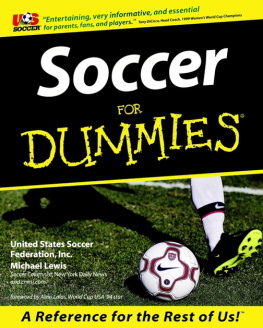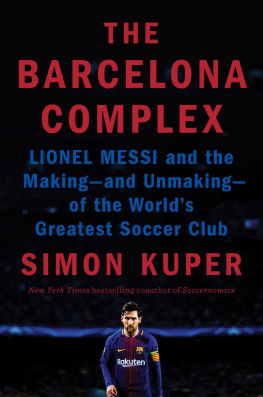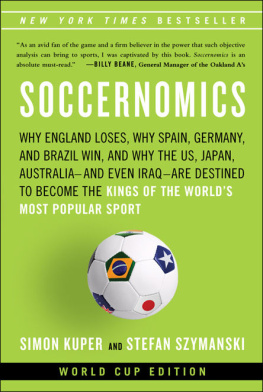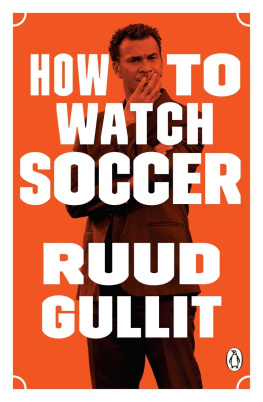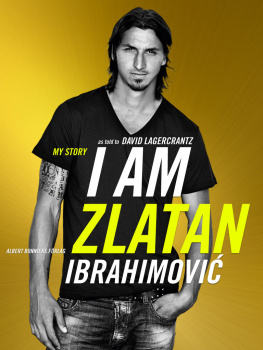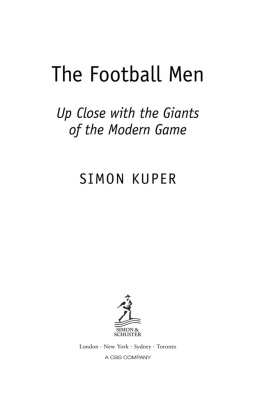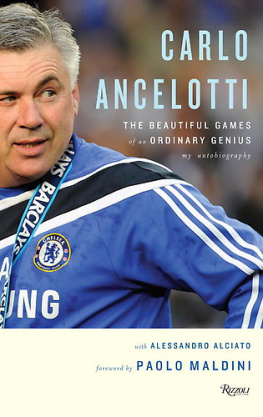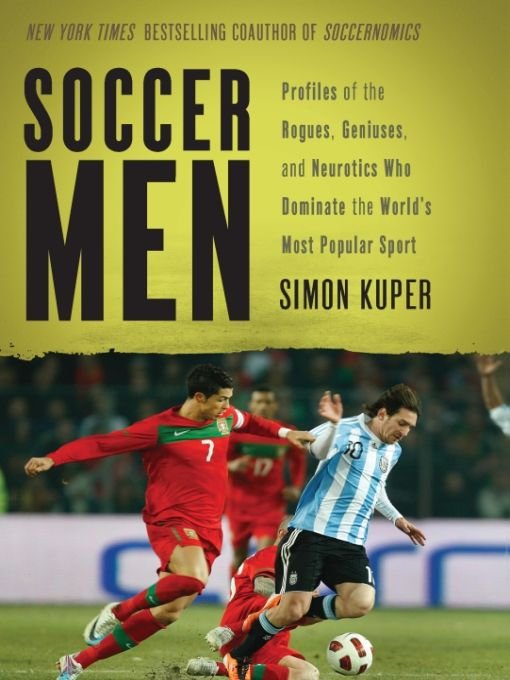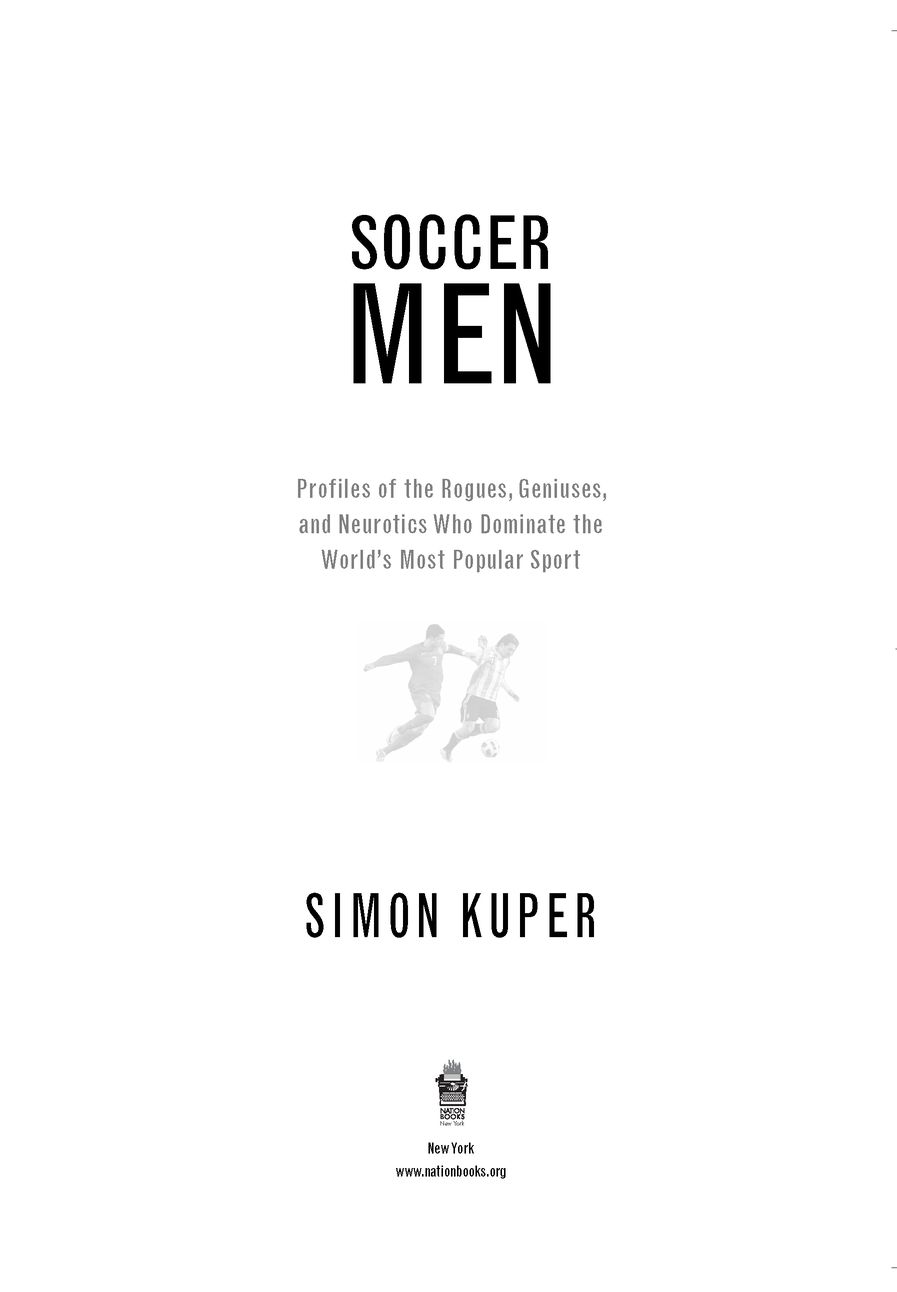Table of Contents
ALSO BY
SIMON KUPER
Soccer Against the Enemy
Ajax, The Dutch, The War
Soccernomics (with Stefan Szymanski)
To my father, who suggested the
idea for this book, as he did for so many other
projects; to Pamela, for tolerating me while
I wrote it; and to Leila, Leo, and Joey,
who I hope will read it one day.
INTRODUCTION:
ORDINARY MEN AND CRAFTSMEN
In his book The Football Man, published in 1968, Arthur Hopcraft marvels at the fame of soccer playersat least in countries other than the United States. Say the word Georgie in Manchester, Hopcraft writes, or in close proximity to some kind of [soccer] activity in any other British town, and everyone will know at once that you are talking about Best. If you say Matt, they think Busby. Denis evokes Law, Nobby means Stiles, and so on. Hopcraft explains this not by the fanaticism... but by the deep and lasting impact made by men of extraordinary personality in the context of sport.
Hopcraft began covering soccer at the age of sixteen. English talk show host Michael Parkinson, an early colleague at a local paper in the tough miners town of Barnsley, remembers him as the first reporter I had encountered who wore a bow tie, which took courage in Barnsley in the 1950s.
Later Hopcraft became a well-known writer for television; in 1979 he wrote a famous adaptation of John Le Carrs Tinker, Tailor, Soldier, Spy. But before abandoning soccer he packaged much of his best work in The Football Man, and its that book that made me decide to write this one.
In his book, Hopcraft anatomizes English soccer of the time in a series of profiles: The Player, The Manager, The Director, The Referee, The Fan (mostly about hooligans), and so on. Hopcraft meets and describes George Best, Alf Ramsey, a young Ken Bates (then chairman of Oldham), and many others. He takes them seriously, not as demigods but as ordinary men and craftsmen. His overly polished prose is now a bit dated, and we no longer need his assurances that soccer is important enough to write about (quite the opposite: We now often need to be told that it isnt). Still, The Football Man is a wonderful book, and prescient in places. Hopcraft tells us that contrary to what many people in 1968 thought, a European Super League would never happen, but he adds, A more likely suggestion is that a domestic Premier League may hive off from the English Football League to confine top-quality soccer to perhaps a dozen of the countrys major areas of population. This is a perfectly rational idea, and one which is known to find favour among a number of men in influential positions in soccer.
I would never dare compare myself to Hopcraft, and I dont wear bow ties, but men of extraordinary personality still make an extraordinary impact in the context of sport, and in Soccer Men I give my take on the soccer men of our day. I have done my best to understand what they are like, not as demigods but as ordinary men and craftsmen.
Like Hopcraft, I began writing about soccer at the age of sixteen: a profile of Dutch player Ruud Gullit, published in World Soccer magazine in October 1986, for which I think I was paid about $40, which was a lot of money to me then. (Ill come clean straight away and say that a lot of the profiles in this book are of Dutchmen. Just be thankful I didnt grow up in San Marino.) Ive been profiling players, and managers, and directors, and sometimes even fans ever since. I joined the Financial Times newspaper in 1994, and am there again today, but in between Ive had stints at the Observer (one of Hopcrafts old papers) and the Times (London). I have also written for innumerable magazines and papers from Japan (good pay) to Argentina (not so good).
I have never thought that most soccer players have anything special to say. I know a colleague who believes that only by speaking to a real live player can you access truths about the game. This man is forever texting players, and saying things like, If you speak to Franz Beckenbauer, hell tell you that...
I reject that idea. I do believe that you can access truths about the game by speaking to Arsne Wenger, if he feels like telling you. I dont believe you can access them by speaking to Wayne Rooney.
In fact, now that I have reached middle age, Ive increasingly given up chasing interviews with players. It isnt worth the humiliation. Sometimes a magazine will call and ask, Can you get an interview with X? I always say that you can: if you want to spend weeks sending faxes that somehow never arrive, phoning impatient agents on their cell phones, hanging around training grounds, and trading favors with boot sponsors. In the end youll get an interview with X. Hell probably turn up hours late, say, I hope well win on Saturday, and then drive off again.
Another colleague of mine describes acting as an interpreter for a star who had just joined Real Madrid. As the two of them sat in the car heading for the press conference where the star was to be presented, my colleague asked him what message he wanted to convey to the waiting media. The star looked surprised at the thought. The aim, he explained, is to say nothing.
Soccer players almost never say, No comment. As the English playmaker Paul Gascoigne once pointed out, if you do that, the newspaper will report that the player said, No comment, which makes him look suspicious. Instead, the player says sweet nothings.
I live in Paris, and the other month I caught Franck Ribry being interviewed on French television. It was impressive to see how fluently the phrases rolled out: We played well.... Another big game coming.... Lets hope we can win.... Only the team performance matters. In its way, it was a perfect performance. This kind of drivel often satisfies interviewers, too. Many newspapers and television stations barely worry about the content. What they are trying to show is access to playersor the appearance of access. That by itself is enough to sell. I think I sold my interview with Kak to publications in eight countries.
Of course, sometimes you catch a player on a good day, often after he has retired, and then the interview is a pleasure. I felt that in some of the profiles in this book: going around Cape Town with Bruce Grobbelaar, around Rotterdam with Johnny Rep and Bernd Hlzenbein, or sitting in the Polo Bar in Ascot, England, with Glenn Hoddle. Soccer players tend not to respond well to abstract questions about emotions (How did you feel when?...), but if you ask about specific moments or places or people, they sometimes get going. Even interviewing active players can be worthwhile. These people are roaring with energy, almost never have low blood sugar or a hangover, and are fascinated by what they do. Nicolas Anelka and Rivaldo were not pleased to see me, but they did say interesting things.
Then there is the intangible sense of a person that you can get only from actually meeting him: his aura, if you like. Once in the Nou Camp stadium someone introduced me to a bandanna-wearing Ronaldinho. While we exchanged pleasantries, I had nearly a minute to take him in from point-blank range. As he stood there, his legs were constantly in motion. He was bouncing, almost dancing on the spot. He also couldnt stop looking around. This may just have been desperation to escape a British geek, but I risked an instant psychiatric diagnosis: attention deficit disorder.


